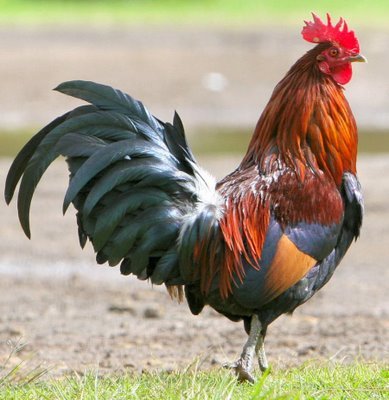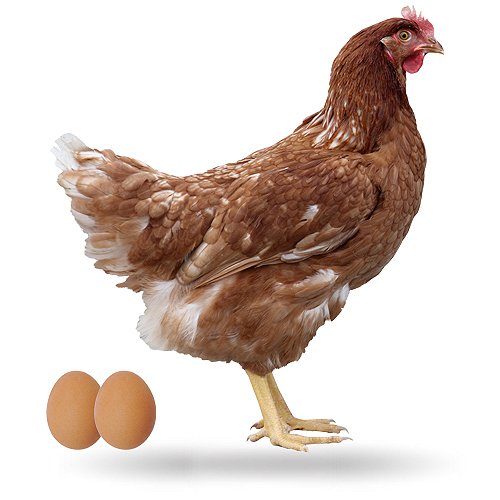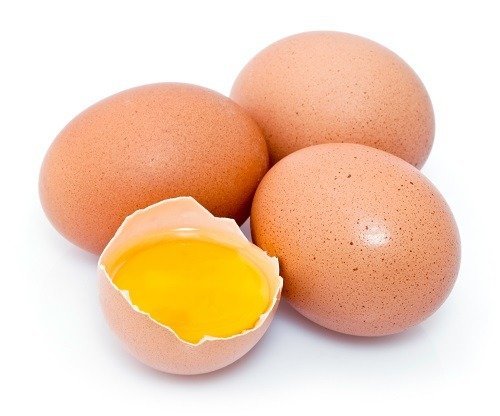Laying hens and egg benefits.
source

The hen (Gallus gallus domesticus) belong to the domestic subspecies from the species Gallus gallus, corresponds to the family of Phasianidae, and is a species of galliform bird. Belongs to the omnivorous bird group
The names used are for the male rooster, for the female hen and for the young chicken.
Hens and roosters have a great sexual dimorphism, the naked eye can distinguish the sexes. The hens are usually smaller than the roosters, they measure 40 cm high and weigh 2 kg, and their color is less striking than that of the males. The males are usually the largest, and they measure 50 cm in height, and weigh up to 4 kg, and have a large reddish crest on the part of the head that they use as a symbol of domination. On the back its plumage is rather golden from the neck to the back, while its tail ends in arched feathers of blue or green coloration. On the side of the head they have two white spots.
source

The rooster, if it is not neutered, throws a sound called a song. Throughout the day the rooster sings, mainly genetically programmed singing for the dawn.
There are different breeds, so their colors in the plumage can vary, as well as their life expectancy, which can go between 5 and 10 years approximately, the same happens between roosters and wild and domestic chickens.
The main advantage of raising our own chickens is that we are going to obtain totally natural and ecological eggs, that is, they will not carry any chemical product, something that our body and our health will thank.
Of all the different breeds of hens, however, I am going to dedicate this article to laying hens and how to raise them.
source

Before acquiring chickens you must know how to take care of them, starting with food and health and ending with a correct adaptation and maintenance of the space they need.
There are several ways to raise layers, but if you want to have your small chicken coop at home and it is very important that you take care of your chickens as best you can and know, and give them a balanced and quality feed. That chickens are happy and do not suffer stress is a key factor in egg laying. To avoid stress in the hens it is advisable to follow a series of routines in their care, such as feeding them at the same time every day.
These animals will need to follow a series of basic guidelines to lay eggs and even increase the number of their production:
*.- Place to live or chicken coop: although you do not believe it, having a suitable place for chickens is fundamental and determinant for the production of eggs. The size that we will provide to each chicken coop has to be enough for each animal to move freely, exercise and can lay eggs.
In addition the chicken coop should be a place that shade and protect chickens from the cold. It must also be surrounded by a fence, in order to prevent the chickens from escaping or from being attacked by an animal. The security that the hens feel will make them lay eggs or not.
*.- Nest or laying boxes. It will be a closed place, with an opening where the chicken can enter. This space must be large enough so that each animal can enter inside and turn on itself. In addition, the floor of the box must be covered with some material, such as straw, which serves to create a comfortable and soft bed.
It is also convenient to put a fake wooden or plastic egg in the nest. This simple gesture will indicate to the hens the place where they have to lay their eggs, since they will also feel safe to do it there.
*.- The light. These animals have a gland that is sensitive to light that affects egg laying. For this reason, it will be necessary that these animals receive at least 12 hours of light a day, either naturally or artificially. A reduction in the time they are exposed to light, will also reduce the number of eggs they put.
*.- The water. This element can never be missing in their habitat. Hens should always have clean and fresh water, since they are animals that drink a lot.
*.- Feeding the hens. It is convenient to give these animals a specific food such as cereal grains, such as corn or wheat. Chickens can also complete their diet with plants, herbs, fresh vegetables, insects and worms. The contribution of calcium in the diet is another key factor in the feeding of chickens that directly affects the production of eggs. One way to provide it is by putting crushed oyster shells.
If we encourage to raise laying hens in addition to having the chicken as food we will have the production of eggs that are part of the diet of the human being.
Eggs are one of the few foods that can truly be classified as "superfoods." An egg only contributes eighty calories, contains protein, choline, iron and zinc, most of these nutrients are found in the yolk.
source

Benefits of eggs:
1.- They are very nutritious: A complete egg contains all the necessary nutrients to convert a single cell into a baby chicken. It can be described as having:
Vitamin A: 6% of the CDR.
Folate: 5% of the CDR.
Vitamin B5: 7% of the CDR.
Vitamin B12: 9% of the CDR.
Vitamin B2: 15% of the CDR.
Phosphorus: 9% of the CDR.
Selenium: 22% of the recommended daily dose.
This comes with 77 calories, 6 grams of protein and 5 grams of healthy fats.
The eggs also contain decent amounts of vitamin D, vitamin E, vitamin K, vitamin B6, calcium and zinc.
If you can get organic eggs (no chemicals, no hormones), these are even better. They have more Omega-3 and contain more vitamin A, E, choline and other nutrients.
2.- The eggs are high in cholesterol, but they do not negatively affect the cholesterol of the blood:
Eggs are high in cholesterol containing 212 mg, which is more than half the recommended daily intake (300 mg), but does not necessarily increase blood cholesterol. Actually, the liver produces large amounts of cholesterol every day. When we eat more eggs, the liver instead produces less cholesterol.
People with genetic disorders, such as familial hypercholesterolemia or a type of gene called ApoE4, should minimize or avoid eggs completely.
3.- Eggs increase cholesterol ("good") HDL-:
HDL means, high density lipoprotein, for its acronym in English (High Density Lipoprotein). People who have higher HDL levels usually have a lower risk of heart disease, stroke and various health problems.
Eating eggs is a good way to increase HDL.
4.- Eggs contain choline:
Choline is a nutrient that most people do not even know exists. It is a very important substance and is often grouped with the B vitamins. Choline is used to build cell membranes and has a role in the production of signaling molecules in the brain, along with several other functions.
A single egg contains more than 100 mg of this important nutrient.
5.- Eggs convert LDL cholesterol from small, dense to large:
LDL is generally known as the "bad" cholesterol. There are small dense LDL particles and then there are the large LDL particles. Many studies have shown that people who have small, dense LDL particles have a predominantly increased risk of heart disease, unlike people who have mostly large LDL particles.
The fact that the egg transforms the particle of LDL cholesterol from small to large is linked to a lower risk of heart disease:
6.- The eggs are rich in vitamin A and contain lutein and zeaxanthin, antioxidants that have important benefits for the health of the eyes:
Studies show that the consumption of adequate amounts of these nutrients can significantly reduce the risk of cataracts and macular degeneration, two very common eye disorders.
7.- Eggs raised ecologically (without chemicals), decrease triglycerides:
The eggs of hens that are raised ecologically tend to be much higher in Omega-3 fatty acids. Omega-3 fatty acids are known to lower blood triglyceride levels, a known risk factor for heart disease.
8.- The eggs are rich in quality proteins:
Proteins are the building blocks of the main particles of the human body. They are used to make all kinds of tissues and molecules that serve both structural and functional purposes. Getting enough protein in the diet is very important
Eating enough protein can help you lose weight, increase muscle mass, lower blood pressure and optimize bone health.
9.- Eggs can reduce the risk of stroke, because their consumption reduces the risk of heart disease.
10.- Eggs are highly satisfying and tend to make you eat fewer calories, helping you lose weight.
Eggs have high scores on a scale called the satiety index, which measures the ability of foods to induce satiety and reduce subsequent calorie intake.
Well my dear friends of @farms I hope it is very useful to know about laying hens and the benefits of eggs.
Contributed by @ nashilda17